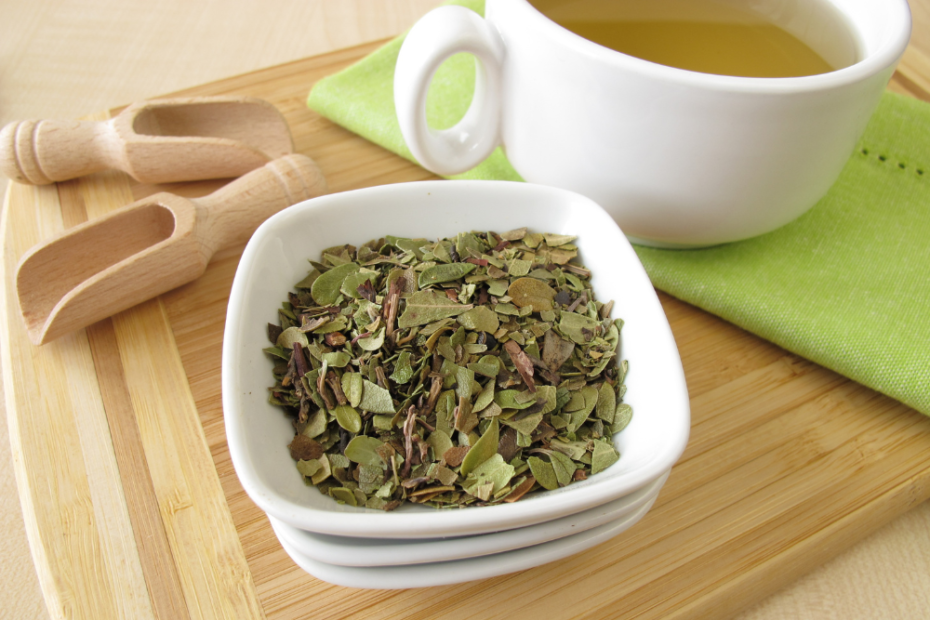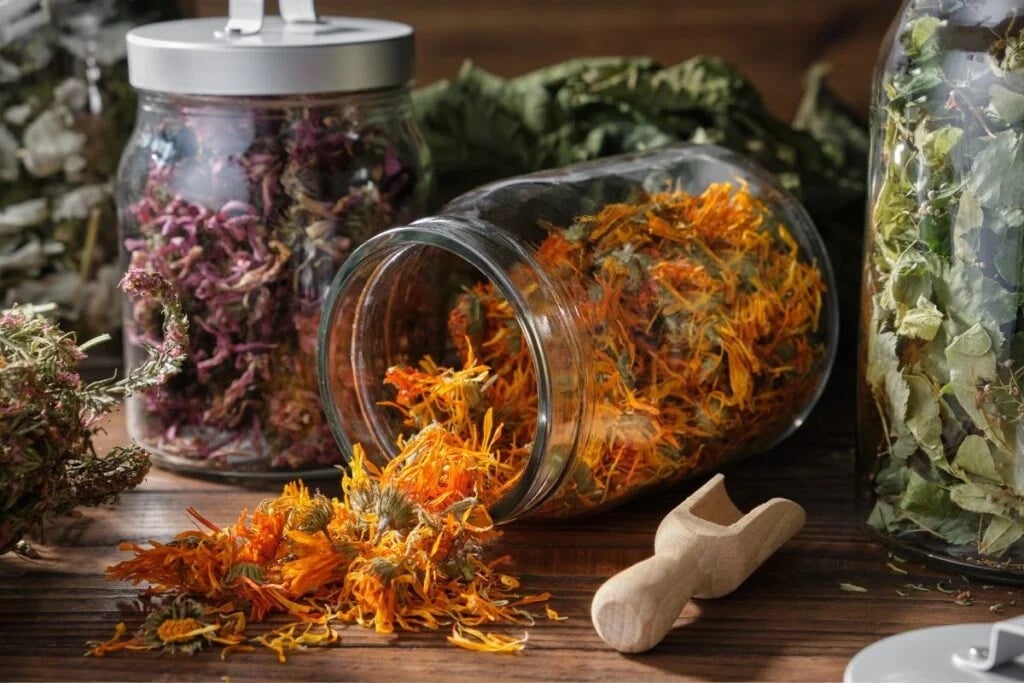Bearberry (Arctostaphylos uva-ursi) is a shrub or shrub on which the berries favored by bears grow. About 60 species are distributed worldwide, but only one or two species of bearberry grow in Europe. The bearberry Arctostaphylos uva-ursi is a species of interest for making Uva Ursi tea. This bearberry also has hog cranberry, bear’s grape, sandberry, and Kinnikinnick names. We will discuss what illnesses Uva Ursi tea benefits do cure.
The plant grows tight to the ground, about 60 cm tall, with branches spreading along the ground and tiny, thick, and stiff leaves. It blooms white in May–June, with drooping florets in wobbly clusters, and has a pink corolla. The fruit is a round, small, mealy, bright red berry. The bearberry grows in dry pine forests, reinforcing the sandy surface.
Bearberry—A Medicinal Plant Since The 2nd Century
The history of the medicinal use of bearberries dates back to at least the 2nd century. At this time, ancient people widely used it as a diuretic, astringent, and antiseptic cure. American Indians used it as a medication for headaches, for cystitis, and as a general tonic to strengthen the kidneys—at a time when nobody had discovered sulfate drugs and antibiotics. Native Americans used bearberry leaves with tobacco and other herbs in religious ceremonies as incense (a type of incense designed to purify the air of harmful substances) or smoked them in a sacred pipe to transmit the smoker’s prayers to the Great Spirit.
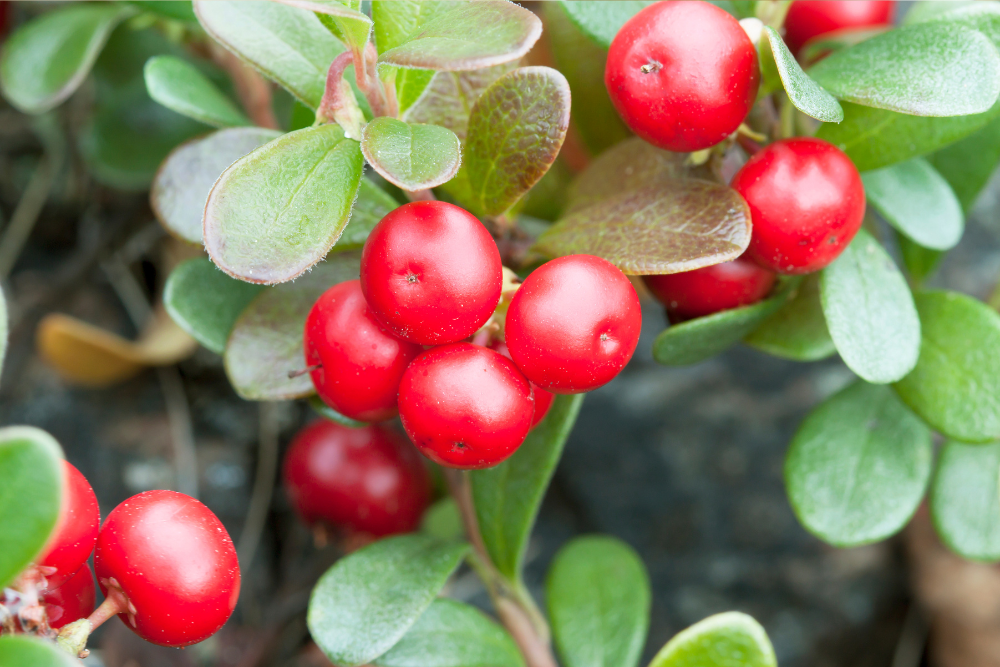
Gathering Bearberry Leaves
Bearberry leaves are commonly used for medicinal purposes. People harvest it in early spring before the buds burst. Another date to gather leaves is in late July or August when mature first-year leaves.
The leaves’ drying process begins in a place protected from direct sunlight. When properly dried, the raw material must be a nice, natural green color, slightly crumbly, odorless, and with a bitter, astringent taste. Dried bearberry leaves shall be stored in airtight packaging in a dry, dark place. The leaves do not lose their beneficial properties for 5 years after harvesting.
Uva Ursi Tea Benefits The Body
Bearberry tea is a medicine to treat illnesses rather than simply a drink like other usual teas. The uva ursi tea benefits include:
A help against bladder infection: cystitis. This disease is much more familiar to women than to men. This infection causes abdominal pain, a constant urge to urinate, a burning sensation, and sometimes blood in the urine. Bearberry leaves contain a high concentration of arbutin, which bacteria convert into hydroquinone, an antimicrobial and potent bacteria-killing molecule. This compound relieves cystitis and other urinary tract infections. Bearberries relieve irritation, reduce inflammation, and fight the bacteria that cause this troublesome condition. However, bearberries are most effective when the urine is alkaline.
Bearberry, or uva ursi, tea is also beneficial for digestive health. The antibacterial properties of bearberries inhibit the activity of E. coli and Proteus vulgaris, as well as some strains of Staphylococcus bacteria, which protect against and prevent intestinal infections. The high content of tannins can be effective in treating diarrhea and dysentery.
Wound healing. Bearberries contain diuretic phytochemicals, ursolic acid, a strong astringent, and allantoin, which stimulate the growth of healthy new cells and wound healing. Tannic and phenolic acids have health benefits: antiviral, antifungal, anti-inflammatory, and anti-cancer effects. These plants effectively inhibit bleeding.
People drink bearberry leaf tea for general detoxification of the body and blood purification.
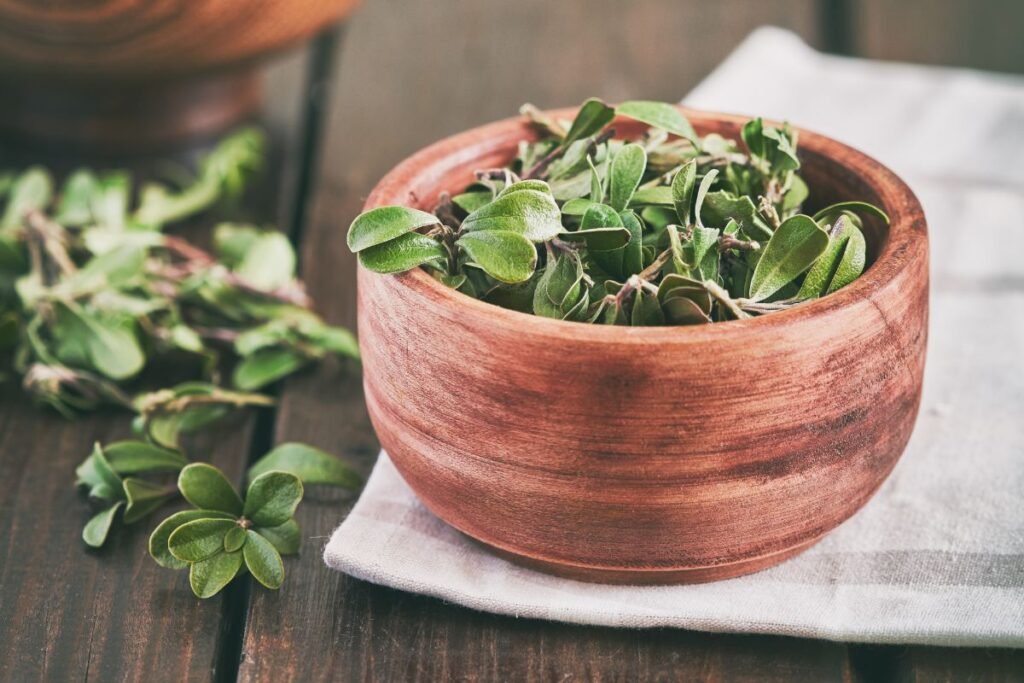
How to Prepare Uva Ursi or Bearberry Tea?
It is best to prepare bearberry tea using the traditional method. Pour boiling water at 100 degrees over the bearberry leaves. Steep for about 15 minutes, depending on the robustness of the tea you want. As bearberry tea is bitter, you can sweeten it with sugar, honey, or your favorite syrup.
You can also make your uva ursi tea by steeping it. This method leaves less bitter tea, which has a higher antioxidant content. Pour cold water over the bearberry leaves (the higher the pH of the water, the stronger the tea will be) and steep for 12 hours.
How Do I Take Uva Ursi Leaf Tea?
Uva ursi tea for bladder inflammation can increase its effectiveness by taking ½ teaspoon of baking soda with water before drinking. This alkalizes the urine, making the healing power of bearberries more effective.
A better option for medicinal use is to extract a bearberry leaf infusion instead of steaming or boiling. The boiling process causes leaves to release tannins, which harm the stomach and intestines.
Bearberry tea can be used for therapeutic purposes for one week. After this time, a doctor should consult you for further treatment.
Bearberry and cranberry have a double influence on urinary tract diseases.
The beneficial properties of cranberries can enhance bearberry leaf tea. The antioxidants (vitamins A and C) and other substances in cranberries effectively suppress inflammation and treat urinary tract infections.
For this tea, you will need:
- 1 teaspoon of dried bearberry leaves
- 2 teaspoons of natural, unsweetened cranberry juice
- 1 teaspoon of honey
- 1 cup of water
Pour boiling water over the bearberry leaves, cover, and leave to stand for 20–25 minutes. Then, strain the infusion and add the cranberry juice and honey. Drink warm.
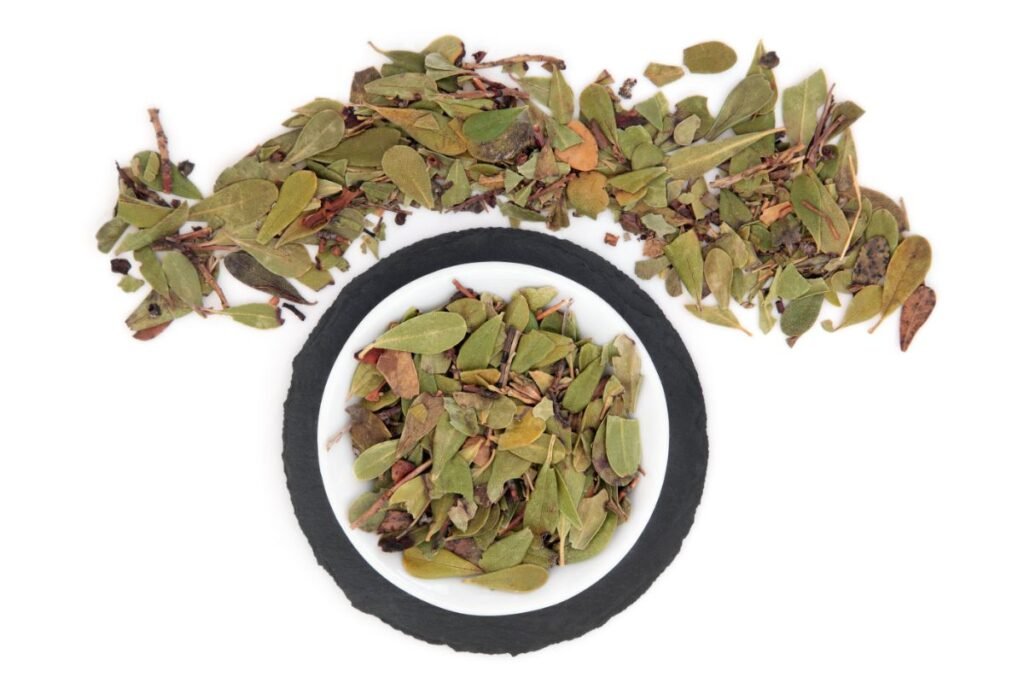
Uva Ursi Tea Benefits for Skin Care
Thanks to their antioxidant-rich composition, bearberries help to stop skin aging. You can use it as a targeted remedy for skin lightening and pigmentation. This skin-boosting effect is attributed to antioxidants and arbutin.
A busy life, lack of sleep, and many stressful situations often leave traces on our faces, particularly in the darkening of the lower eyelids. Bearberry extract preparations are particularly beneficial for managing this condition.
Bearberries also tighten, detoxify, and astringent the skin, helping to reduce swelling and oiliness. A decoction of bearberry is suitable for washing or wiping nursing patients.
Bearberries Are A Valuable Nutritional Supplement
Bearberries are eaten raw or cooked. They also contain beneficial substances, which are worth adding to your diet. Native American tribes used bearberries to make sauces for meat and fish. Dried berries were used to make bread and cakes.
These berries do not have a distinctive taste. However, you can make a delicious jam with other berries or fruits.
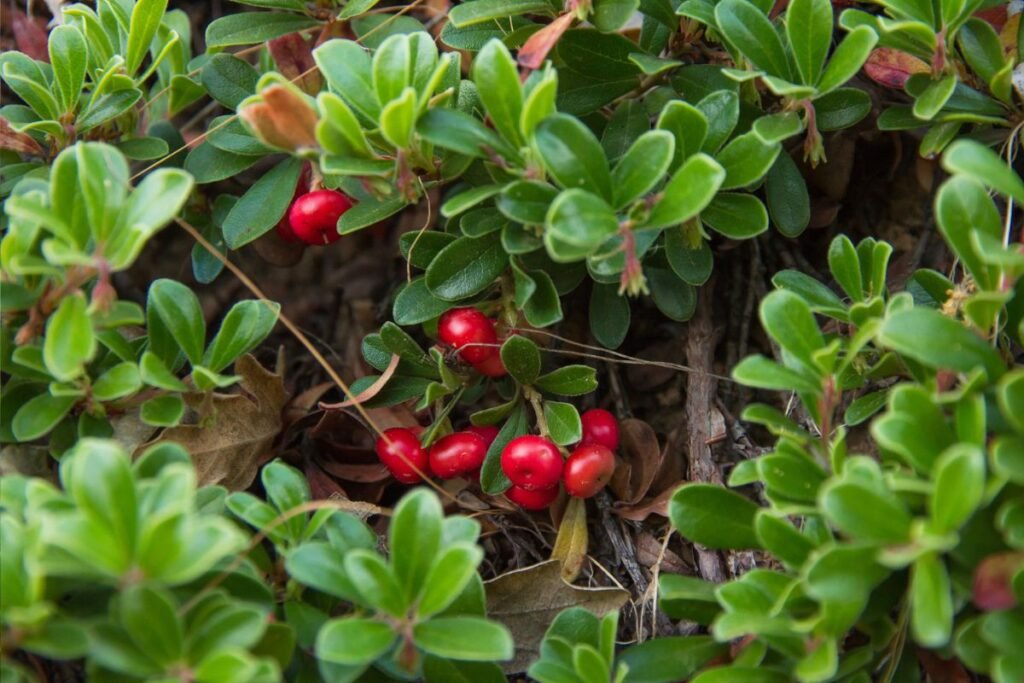
Bearberry Sauce
Bearberries can make a valuable sauce suitable for game and fish dishes.
Ingredients:
- 2 liters of bearberries, washed and stemless
- sugar (to taste)
- 1 teaspoon lemon juice
Put the berries in a saucepan and cook over medium heat for 5–10 minutes, until soft. Then, crush the berries and strain through a sieve or cheesecloth to remove the seeds. It is essential to keep as much pulp as possible. Put the sieved berries back in the pot and add the sugar. You can use about 1 cup of sugar per cup of berry pulp. Pour the lemon juice, mix it well, and bring to the boil. Turn off the heat, allow it to cool, and pour the sauce into sealed jars. Store this dressing in the fridge.
Bearberry or Uva Ursi Tea Is Not for Everyone
Everybody knows, that herbs strengthen the body and cure diseases. However, herbs can cause side effects when taken alone or in interaction with other herbs, supplements, or medicines. For these reasons, herbs should be used with caution, with regular health monitoring, and preferably under the supervision of a health professional.
Although bearberries have many health benefits, especially for the urinary system, they should not be taken for more than 5 consecutive days or more than 5 times a year. Hydroquinone is a potent compound that kills bacteria, but frequent use can damage the liver.
Bearberry tea is not recommended for children, pregnant women, or breastfeeding women.
People with high blood pressure or individuals suffering from Crohn’s disease, digestive disorders, ulcers, and kidney or liver disease should also avoid bearberry tea.
Side effects may occur if bearberry tea is taken in excess:
- nausea
- vomiting
- irritability
- insomnia
It is best to consult your doctor about uva ursi tea consumption.
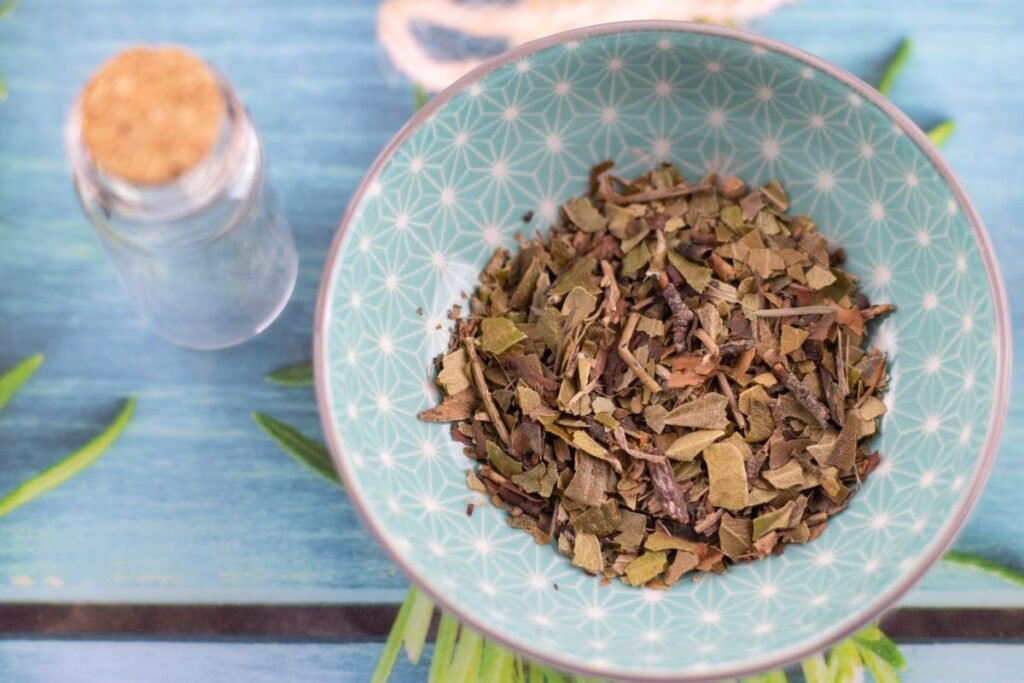
Sources:
- https://www.verywellhealth.com/uva-ursi-health-benefits-4582831
- https://www.drugs.com/npp/uva-ursi.html
- https://www.webmd.com/vitamins/ai/ingredientmono-350/uva-ursi
Associative photos from © Canva.
